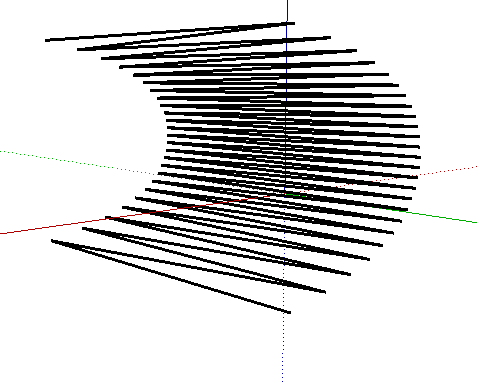[Plugin] Simple Catenary Curve
-
A quick little plugin i put together. Its very basic

Usage: draw->simple catenary curve, then rotate and scale the curve in to place. A small warning is also attached, ive used a method that can some times crash sketchup, although it hasnt done so during my testing.
If i ever get round to learning how to make proper tools (in the ruby sense) i'll try and make it more point-and-click.
And if your wondering what a catenary curve is, its the shape an unloaded string/chain/cable/wire will make when suspended between 2 points. e.g. power cables, washing lines etc. http://en.wikipedia.org/wiki/Catenary_curve
-
Hey Remus:
Next step is "chain maker" or "rope maker"..

User inputs parameters of a link or the name of an Link component and the links are strung properly on a series of connected Catenary curves.
-
thank you

this is going to be very very useful.. -
Yes, I'd vote for JClements idea. It would certainly keep the file small.
-
Ah. I was wondering when we'd see this plugin. I'm curious to look at the code.

-
its really nothing special thom. i was initially going for the whole point and click thing but i kept getting confused

-
And as for how to quickly model a catenary in SU, see this model in the Warehouse:
http://sketchup.google.com/3dwarehouse/details?mid=4dd6375bd3e37bc7f30a9640f41eb5ed&prevstart=0(but of course, this is not to lessen this cool plugin, Remus
 )
) -
Fairly sure thats a parabola, not a catenary curve.
-
Is it really?
Hm... I last studied maths more than 26 years ago.

Anyway, I can model parabolas then!
Thanks!
-
Doubled checked on wikipedia and it seems it is a parabola. Part of the conic sections if you fancy investigating further.
-
Hi remus, that's a wonderful idea.(Didn't know the term Catenary though).
By the way, could multiple Catenary curves define a tensile structure? -
You probably could, but i dont think it would be physically accurate. Catenary curves only describe lines with no forces (other than gravity) acting along their length.
I know that in simple cases like a suspension bridge the curve is a parabola, but i dont know if this would still be true for more complicated tensile structures.
-
@remus said:
Doubled checked on wikipedia and it seems it is a parabola. Part of the conic sections if you fancy investigating further.
I believe you, Remus, truely.

-
I just though other people might be interested (although i realise maths geeks are probably in short supply around here
 )
) -
I'm no math geek - but that cursed curve had me stumped when I wanted to make a chain/rope plugins.
I've still not looked at the code, but can it be used to specify two 3D points and the total length of the curve?
-
2 3d points is fairly easy as long as the 2 points are level, if not you have to start messing around with numerical solutions and it all gets rather messy.
Its similarly difficult to specify a length if i remember correctly.
-
Yea, that's what I tried. Different heights.
And also specifying length. Only solution to the length I could find was a method that did loop of approximation until it came within a given tolerance... -
Remus,
I am glad you show the way to Users to get their ownautomation via Ruby. Obviously, Sketchup needs to be complemneted by some generic Rubies that does geometrical operations that SU does not do in native.
But Ruby is also a very convenient way for individual users to speed up their workflow with some adhoc, simple programming. It's a little bit like Excel macros. They are meant for users to help with a few lines of code. But of course, some specialists could also write complete applications with thousands of lines of VB Scripts for Excel and share them to a community of users.
Your program is 10 lines of code and does the work of creating a catenary curve. For the purpose of what it does for an individual user, it is very concise and elegantly written. Ruby is not very complex for simple things and you demonstrate it in your script.
Now, yes, for writing a general plugin drawing any catenary curve in 3D between 2 points, with options, live feeback and postedition, the script would have to go one level beyond, and may not be an easy task for an occasional programmer (but do not worry, there is also a strong community of script writers!).
So, I can only send you my support for showing what Ruby can do with a few lines of code, to automate repetitive tasks or make simple calculations.
Fredo
-
@remus said:
I just though other people might be interested (although i realise maths geeks are probably in short supply around here
 )
)count me in the math geek column!
great little program, Ive been using it to learn more about Ruby.=begin Simple Catenary Curve script Author; Remus Knowles =end module RTK def self.simple_cat_curve ents = Sketchup.active_model.active_entities pts = [] # add or delete interval to be evaluated intervals = [-3,-2.75,-2.5,-2.25,-2,-1.75,-1.5,-1.25,-1,-0.75,-0.5,-0.25,0,0.25,0.5,0.75,1,1.25,1.5,1.75,2,2.25,2.5,2.75,3] intervals.each{|e| # main math formula, try x = (Math.sinh(e)), or (Math.sin(e)) x = (Math.cosh(e)) # pts.push([e,20,x]) entering 20 moves the curve along green axis 20 units # pts.push([e,x,0]) draws the curve in plan view # pts.push([x,0,e,]) draws the curve in elevation view pts.push([x,10,e]) pts.push([x,0,e,]) pts.push([x,-10,e]) } cat_curve = ents.add_curve(pts) cat_curve_grp = ents.add_group(cat_curve) end#method end#module UI.menu("Draw").add_item("Simple Catenary Curve") {RTK.simple_cat_curve}my attached code documents some of the things I have tried

-
Fred, thanks, it means a lot coming from someone of your experience.
Tomot, good effort on the mods, best way to start learning ruby in my opinion.
Advertisement







